Early Years Pedagogy: Outcomes of Planned Activities Report
VerifiedAdded on 2023/01/05
|10
|3630
|41
Report
AI Summary
This report delves into the realm of early years pedagogy, specifically within a nursery setting catering to children aged 2-3 years. It commences with an introduction to pedagogy, highlighting its significance in shaping children's development through various strategies, techniques, and interactions. The main body of the report then evaluates the outcomes of planned learning activities, emphasizing the importance of progressive learning and development targets. It explores the application of constructivism and progressive education approaches, emphasizing hands-on projects and experiential learning. Furthermore, the report reflects on children's active engagement in inclusive activities, such as exploring the natural environment, and the role of adults in selecting appropriate pedagogical approaches, including Froebel and forest school methodologies. The report also touches upon the Early Years Foundation Stage framework and the importance of fostering functional-emotional competencies. The conclusion summarizes the key findings, and the references provide supporting literature on the subject.
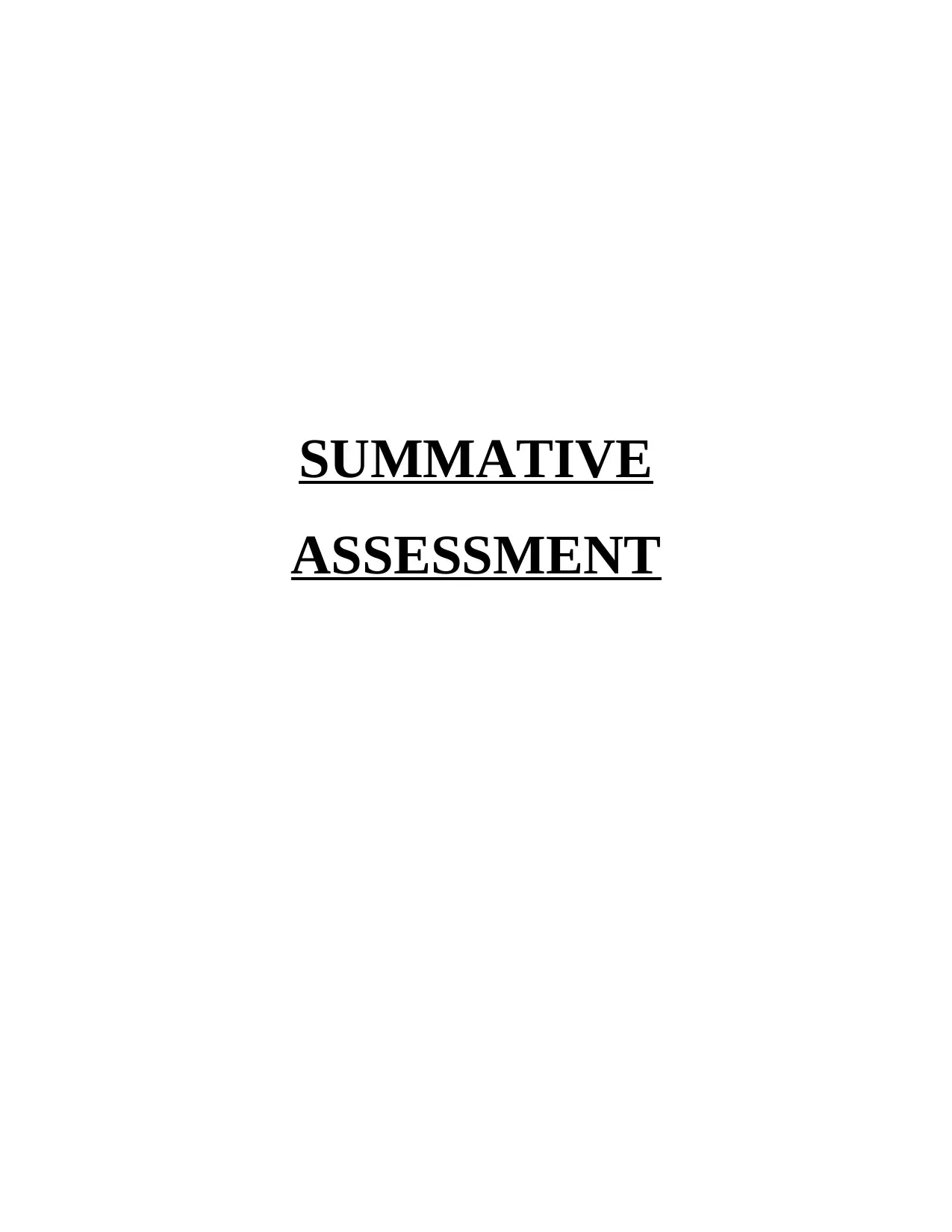
SUMMATIVE
ASSESSMENT
ASSESSMENT
Paraphrase This Document
Need a fresh take? Get an instant paraphrase of this document with our AI Paraphraser
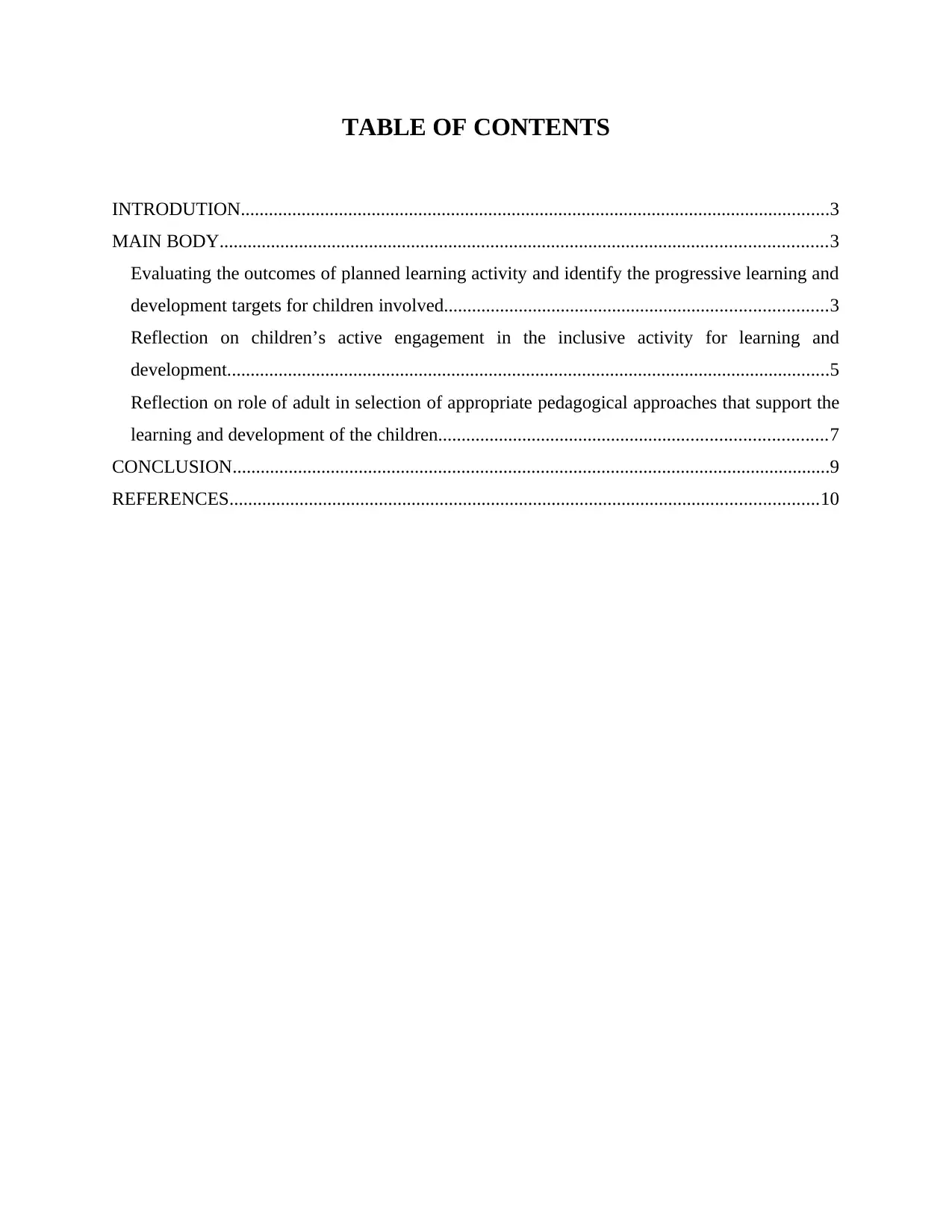
TABLE OF CONTENTS
INTRODUTION..............................................................................................................................3
MAIN BODY..................................................................................................................................3
Evaluating the outcomes of planned learning activity and identify the progressive learning and
development targets for children involved..................................................................................3
Reflection on children’s active engagement in the inclusive activity for learning and
development.................................................................................................................................5
Reflection on role of adult in selection of appropriate pedagogical approaches that support the
learning and development of the children...................................................................................7
CONCLUSION................................................................................................................................9
REFERENCES..............................................................................................................................10
INTRODUTION..............................................................................................................................3
MAIN BODY..................................................................................................................................3
Evaluating the outcomes of planned learning activity and identify the progressive learning and
development targets for children involved..................................................................................3
Reflection on children’s active engagement in the inclusive activity for learning and
development.................................................................................................................................5
Reflection on role of adult in selection of appropriate pedagogical approaches that support the
learning and development of the children...................................................................................7
CONCLUSION................................................................................................................................9
REFERENCES..............................................................................................................................10
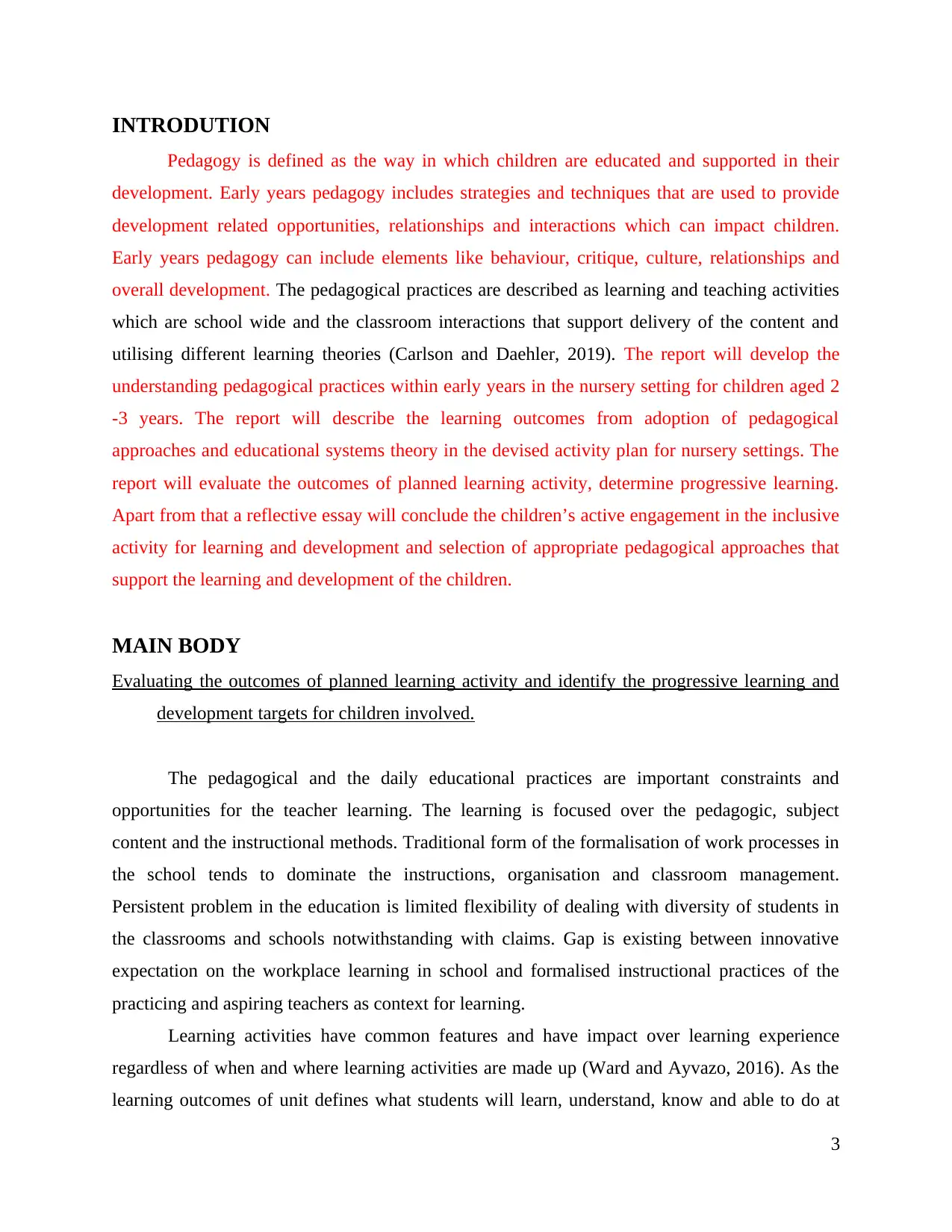
INTRODUTION
Pedagogy is defined as the way in which children are educated and supported in their
development. Early years pedagogy includes strategies and techniques that are used to provide
development related opportunities, relationships and interactions which can impact children.
Early years pedagogy can include elements like behaviour, critique, culture, relationships and
overall development. The pedagogical practices are described as learning and teaching activities
which are school wide and the classroom interactions that support delivery of the content and
utilising different learning theories (Carlson and Daehler, 2019). The report will develop the
understanding pedagogical practices within early years in the nursery setting for children aged 2
-3 years. The report will describe the learning outcomes from adoption of pedagogical
approaches and educational systems theory in the devised activity plan for nursery settings. The
report will evaluate the outcomes of planned learning activity, determine progressive learning.
Apart from that a reflective essay will conclude the children’s active engagement in the inclusive
activity for learning and development and selection of appropriate pedagogical approaches that
support the learning and development of the children.
MAIN BODY
Evaluating the outcomes of planned learning activity and identify the progressive learning and
development targets for children involved.
The pedagogical and the daily educational practices are important constraints and
opportunities for the teacher learning. The learning is focused over the pedagogic, subject
content and the instructional methods. Traditional form of the formalisation of work processes in
the school tends to dominate the instructions, organisation and classroom management.
Persistent problem in the education is limited flexibility of dealing with diversity of students in
the classrooms and schools notwithstanding with claims. Gap is existing between innovative
expectation on the workplace learning in school and formalised instructional practices of the
practicing and aspiring teachers as context for learning.
Learning activities have common features and have impact over learning experience
regardless of when and where learning activities are made up (Ward and Ayvazo, 2016). As the
learning outcomes of unit defines what students will learn, understand, know and able to do at
3
Pedagogy is defined as the way in which children are educated and supported in their
development. Early years pedagogy includes strategies and techniques that are used to provide
development related opportunities, relationships and interactions which can impact children.
Early years pedagogy can include elements like behaviour, critique, culture, relationships and
overall development. The pedagogical practices are described as learning and teaching activities
which are school wide and the classroom interactions that support delivery of the content and
utilising different learning theories (Carlson and Daehler, 2019). The report will develop the
understanding pedagogical practices within early years in the nursery setting for children aged 2
-3 years. The report will describe the learning outcomes from adoption of pedagogical
approaches and educational systems theory in the devised activity plan for nursery settings. The
report will evaluate the outcomes of planned learning activity, determine progressive learning.
Apart from that a reflective essay will conclude the children’s active engagement in the inclusive
activity for learning and development and selection of appropriate pedagogical approaches that
support the learning and development of the children.
MAIN BODY
Evaluating the outcomes of planned learning activity and identify the progressive learning and
development targets for children involved.
The pedagogical and the daily educational practices are important constraints and
opportunities for the teacher learning. The learning is focused over the pedagogic, subject
content and the instructional methods. Traditional form of the formalisation of work processes in
the school tends to dominate the instructions, organisation and classroom management.
Persistent problem in the education is limited flexibility of dealing with diversity of students in
the classrooms and schools notwithstanding with claims. Gap is existing between innovative
expectation on the workplace learning in school and formalised instructional practices of the
practicing and aspiring teachers as context for learning.
Learning activities have common features and have impact over learning experience
regardless of when and where learning activities are made up (Ward and Ayvazo, 2016). As the
learning outcomes of unit defines what students will learn, understand, know and able to do at
3
⊘ This is a preview!⊘
Do you want full access?
Subscribe today to unlock all pages.

Trusted by 1+ million students worldwide
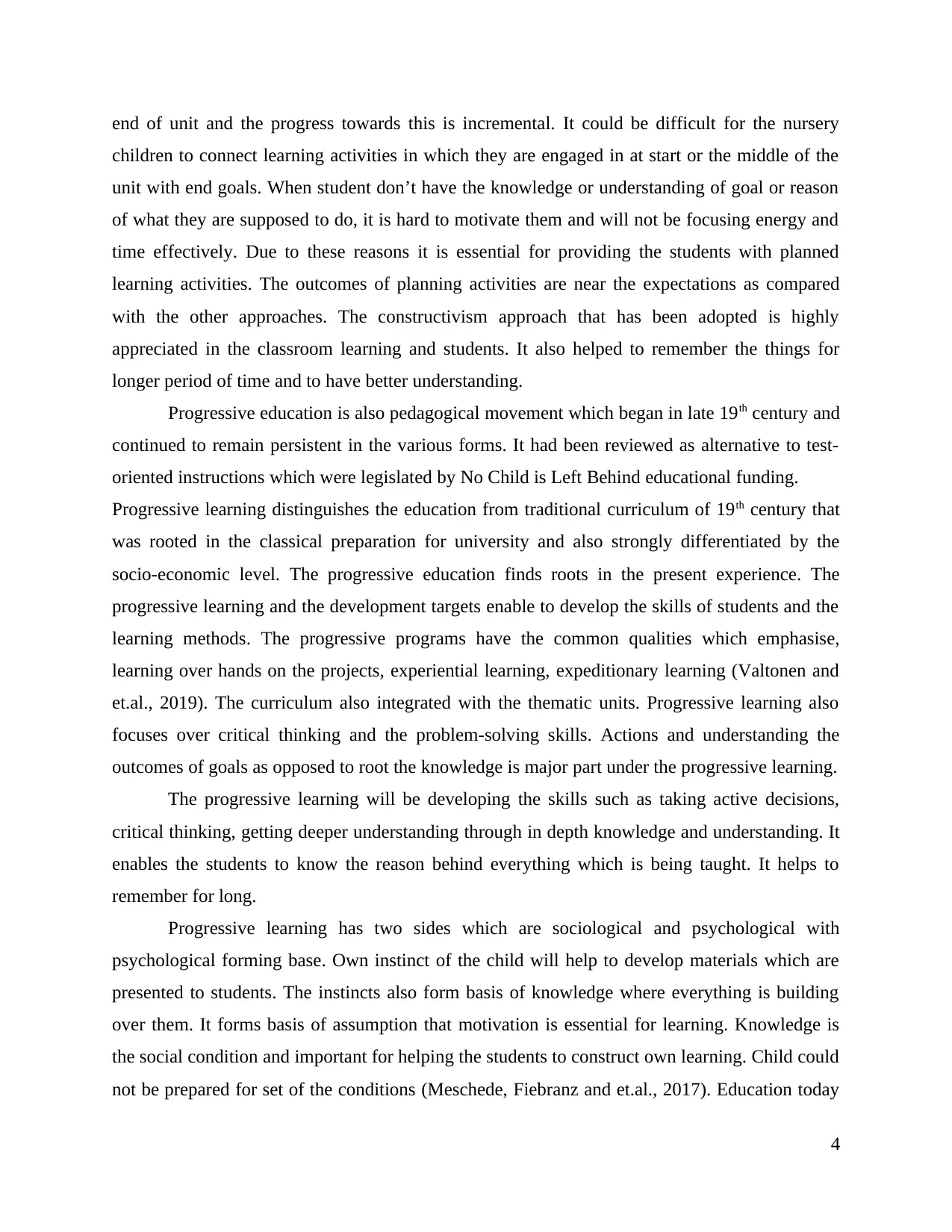
end of unit and the progress towards this is incremental. It could be difficult for the nursery
children to connect learning activities in which they are engaged in at start or the middle of the
unit with end goals. When student don’t have the knowledge or understanding of goal or reason
of what they are supposed to do, it is hard to motivate them and will not be focusing energy and
time effectively. Due to these reasons it is essential for providing the students with planned
learning activities. The outcomes of planning activities are near the expectations as compared
with the other approaches. The constructivism approach that has been adopted is highly
appreciated in the classroom learning and students. It also helped to remember the things for
longer period of time and to have better understanding.
Progressive education is also pedagogical movement which began in late 19th century and
continued to remain persistent in the various forms. It had been reviewed as alternative to test-
oriented instructions which were legislated by No Child is Left Behind educational funding.
Progressive learning distinguishes the education from traditional curriculum of 19th century that
was rooted in the classical preparation for university and also strongly differentiated by the
socio-economic level. The progressive education finds roots in the present experience. The
progressive learning and the development targets enable to develop the skills of students and the
learning methods. The progressive programs have the common qualities which emphasise,
learning over hands on the projects, experiential learning, expeditionary learning (Valtonen and
et.al., 2019). The curriculum also integrated with the thematic units. Progressive learning also
focuses over critical thinking and the problem-solving skills. Actions and understanding the
outcomes of goals as opposed to root the knowledge is major part under the progressive learning.
The progressive learning will be developing the skills such as taking active decisions,
critical thinking, getting deeper understanding through in depth knowledge and understanding. It
enables the students to know the reason behind everything which is being taught. It helps to
remember for long.
Progressive learning has two sides which are sociological and psychological with
psychological forming base. Own instinct of the child will help to develop materials which are
presented to students. The instincts also form basis of knowledge where everything is building
over them. It forms basis of assumption that motivation is essential for learning. Knowledge is
the social condition and important for helping the students to construct own learning. Child could
not be prepared for set of the conditions (Meschede, Fiebranz and et.al., 2017). Education today
4
children to connect learning activities in which they are engaged in at start or the middle of the
unit with end goals. When student don’t have the knowledge or understanding of goal or reason
of what they are supposed to do, it is hard to motivate them and will not be focusing energy and
time effectively. Due to these reasons it is essential for providing the students with planned
learning activities. The outcomes of planning activities are near the expectations as compared
with the other approaches. The constructivism approach that has been adopted is highly
appreciated in the classroom learning and students. It also helped to remember the things for
longer period of time and to have better understanding.
Progressive education is also pedagogical movement which began in late 19th century and
continued to remain persistent in the various forms. It had been reviewed as alternative to test-
oriented instructions which were legislated by No Child is Left Behind educational funding.
Progressive learning distinguishes the education from traditional curriculum of 19th century that
was rooted in the classical preparation for university and also strongly differentiated by the
socio-economic level. The progressive education finds roots in the present experience. The
progressive learning and the development targets enable to develop the skills of students and the
learning methods. The progressive programs have the common qualities which emphasise,
learning over hands on the projects, experiential learning, expeditionary learning (Valtonen and
et.al., 2019). The curriculum also integrated with the thematic units. Progressive learning also
focuses over critical thinking and the problem-solving skills. Actions and understanding the
outcomes of goals as opposed to root the knowledge is major part under the progressive learning.
The progressive learning will be developing the skills such as taking active decisions,
critical thinking, getting deeper understanding through in depth knowledge and understanding. It
enables the students to know the reason behind everything which is being taught. It helps to
remember for long.
Progressive learning has two sides which are sociological and psychological with
psychological forming base. Own instinct of the child will help to develop materials which are
presented to students. The instincts also form basis of knowledge where everything is building
over them. It forms basis of assumption that motivation is essential for learning. Knowledge is
the social condition and important for helping the students to construct own learning. Child could
not be prepared for set of the conditions (Meschede, Fiebranz and et.al., 2017). Education today
4
Paraphrase This Document
Need a fresh take? Get an instant paraphrase of this document with our AI Paraphraser
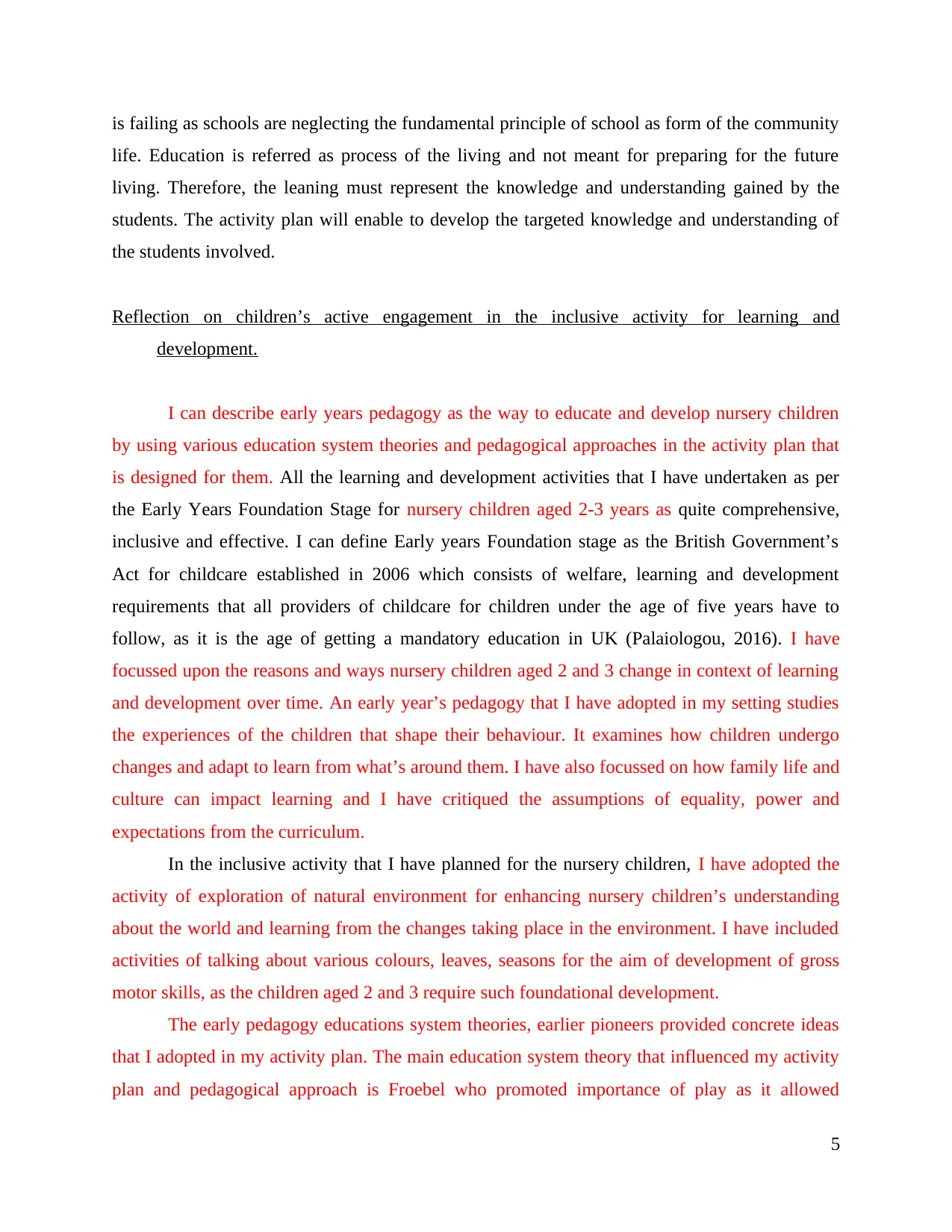
is failing as schools are neglecting the fundamental principle of school as form of the community
life. Education is referred as process of the living and not meant for preparing for the future
living. Therefore, the leaning must represent the knowledge and understanding gained by the
students. The activity plan will enable to develop the targeted knowledge and understanding of
the students involved.
Reflection on children’s active engagement in the inclusive activity for learning and
development.
I can describe early years pedagogy as the way to educate and develop nursery children
by using various education system theories and pedagogical approaches in the activity plan that
is designed for them. All the learning and development activities that I have undertaken as per
the Early Years Foundation Stage for nursery children aged 2-3 years as quite comprehensive,
inclusive and effective. I can define Early years Foundation stage as the British Government’s
Act for childcare established in 2006 which consists of welfare, learning and development
requirements that all providers of childcare for children under the age of five years have to
follow, as it is the age of getting a mandatory education in UK (Palaiologou, 2016). I have
focussed upon the reasons and ways nursery children aged 2 and 3 change in context of learning
and development over time. An early year’s pedagogy that I have adopted in my setting studies
the experiences of the children that shape their behaviour. It examines how children undergo
changes and adapt to learn from what’s around them. I have also focussed on how family life and
culture can impact learning and I have critiqued the assumptions of equality, power and
expectations from the curriculum.
In the inclusive activity that I have planned for the nursery children, I have adopted the
activity of exploration of natural environment for enhancing nursery children’s understanding
about the world and learning from the changes taking place in the environment. I have included
activities of talking about various colours, leaves, seasons for the aim of development of gross
motor skills, as the children aged 2 and 3 require such foundational development.
The early pedagogy educations system theories, earlier pioneers provided concrete ideas
that I adopted in my activity plan. The main education system theory that influenced my activity
plan and pedagogical approach is Froebel who promoted importance of play as it allowed
5
life. Education is referred as process of the living and not meant for preparing for the future
living. Therefore, the leaning must represent the knowledge and understanding gained by the
students. The activity plan will enable to develop the targeted knowledge and understanding of
the students involved.
Reflection on children’s active engagement in the inclusive activity for learning and
development.
I can describe early years pedagogy as the way to educate and develop nursery children
by using various education system theories and pedagogical approaches in the activity plan that
is designed for them. All the learning and development activities that I have undertaken as per
the Early Years Foundation Stage for nursery children aged 2-3 years as quite comprehensive,
inclusive and effective. I can define Early years Foundation stage as the British Government’s
Act for childcare established in 2006 which consists of welfare, learning and development
requirements that all providers of childcare for children under the age of five years have to
follow, as it is the age of getting a mandatory education in UK (Palaiologou, 2016). I have
focussed upon the reasons and ways nursery children aged 2 and 3 change in context of learning
and development over time. An early year’s pedagogy that I have adopted in my setting studies
the experiences of the children that shape their behaviour. It examines how children undergo
changes and adapt to learn from what’s around them. I have also focussed on how family life and
culture can impact learning and I have critiqued the assumptions of equality, power and
expectations from the curriculum.
In the inclusive activity that I have planned for the nursery children, I have adopted the
activity of exploration of natural environment for enhancing nursery children’s understanding
about the world and learning from the changes taking place in the environment. I have included
activities of talking about various colours, leaves, seasons for the aim of development of gross
motor skills, as the children aged 2 and 3 require such foundational development.
The early pedagogy educations system theories, earlier pioneers provided concrete ideas
that I adopted in my activity plan. The main education system theory that influenced my activity
plan and pedagogical approach is Froebel who promoted importance of play as it allowed
5
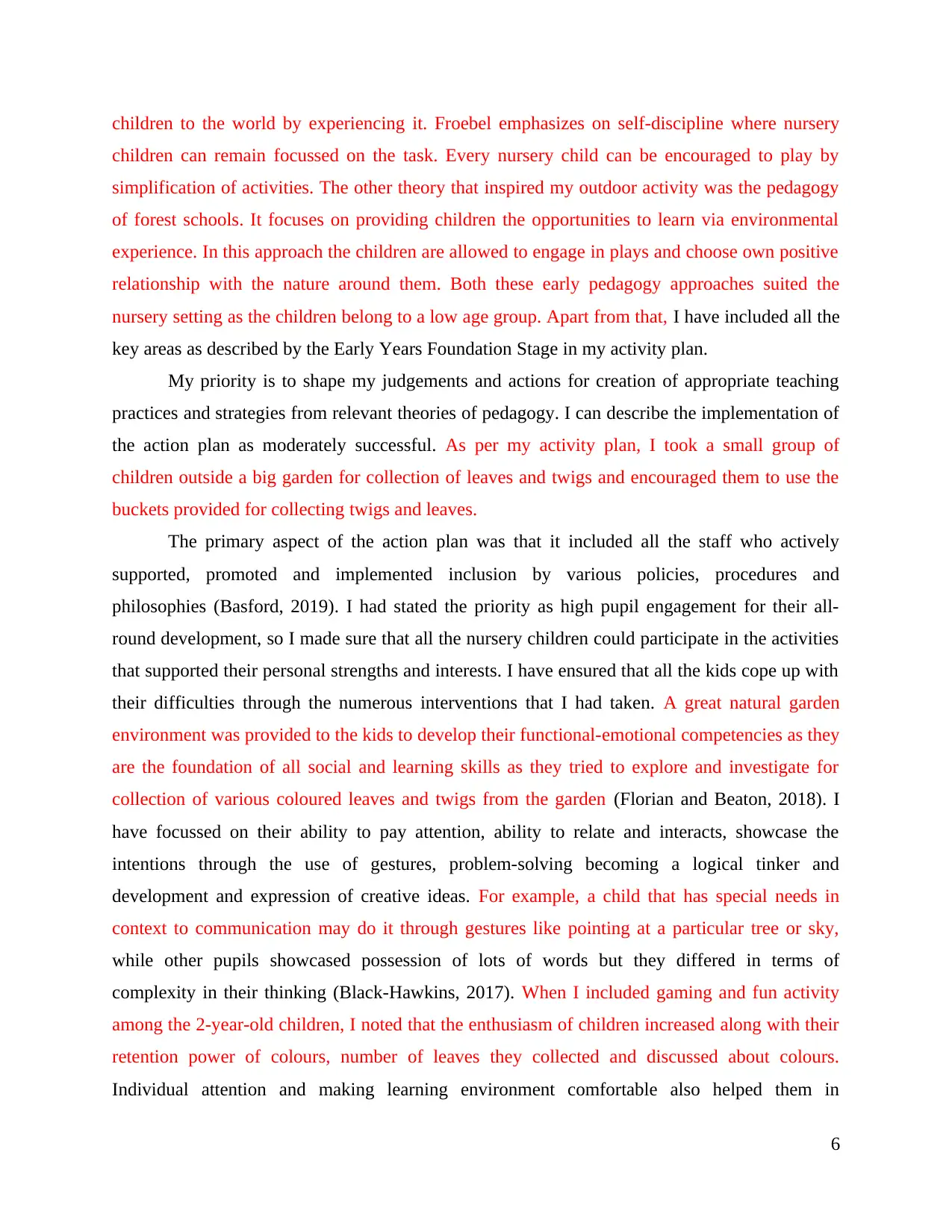
children to the world by experiencing it. Froebel emphasizes on self-discipline where nursery
children can remain focussed on the task. Every nursery child can be encouraged to play by
simplification of activities. The other theory that inspired my outdoor activity was the pedagogy
of forest schools. It focuses on providing children the opportunities to learn via environmental
experience. In this approach the children are allowed to engage in plays and choose own positive
relationship with the nature around them. Both these early pedagogy approaches suited the
nursery setting as the children belong to a low age group. Apart from that, I have included all the
key areas as described by the Early Years Foundation Stage in my activity plan.
My priority is to shape my judgements and actions for creation of appropriate teaching
practices and strategies from relevant theories of pedagogy. I can describe the implementation of
the action plan as moderately successful. As per my activity plan, I took a small group of
children outside a big garden for collection of leaves and twigs and encouraged them to use the
buckets provided for collecting twigs and leaves.
The primary aspect of the action plan was that it included all the staff who actively
supported, promoted and implemented inclusion by various policies, procedures and
philosophies (Basford, 2019). I had stated the priority as high pupil engagement for their all-
round development, so I made sure that all the nursery children could participate in the activities
that supported their personal strengths and interests. I have ensured that all the kids cope up with
their difficulties through the numerous interventions that I had taken. A great natural garden
environment was provided to the kids to develop their functional-emotional competencies as they
are the foundation of all social and learning skills as they tried to explore and investigate for
collection of various coloured leaves and twigs from the garden (Florian and Beaton, 2018). I
have focussed on their ability to pay attention, ability to relate and interacts, showcase the
intentions through the use of gestures, problem-solving becoming a logical tinker and
development and expression of creative ideas. For example, a child that has special needs in
context to communication may do it through gestures like pointing at a particular tree or sky,
while other pupils showcased possession of lots of words but they differed in terms of
complexity in their thinking (Black-Hawkins, 2017). When I included gaming and fun activity
among the 2-year-old children, I noted that the enthusiasm of children increased along with their
retention power of colours, number of leaves they collected and discussed about colours.
Individual attention and making learning environment comfortable also helped them in
6
children can remain focussed on the task. Every nursery child can be encouraged to play by
simplification of activities. The other theory that inspired my outdoor activity was the pedagogy
of forest schools. It focuses on providing children the opportunities to learn via environmental
experience. In this approach the children are allowed to engage in plays and choose own positive
relationship with the nature around them. Both these early pedagogy approaches suited the
nursery setting as the children belong to a low age group. Apart from that, I have included all the
key areas as described by the Early Years Foundation Stage in my activity plan.
My priority is to shape my judgements and actions for creation of appropriate teaching
practices and strategies from relevant theories of pedagogy. I can describe the implementation of
the action plan as moderately successful. As per my activity plan, I took a small group of
children outside a big garden for collection of leaves and twigs and encouraged them to use the
buckets provided for collecting twigs and leaves.
The primary aspect of the action plan was that it included all the staff who actively
supported, promoted and implemented inclusion by various policies, procedures and
philosophies (Basford, 2019). I had stated the priority as high pupil engagement for their all-
round development, so I made sure that all the nursery children could participate in the activities
that supported their personal strengths and interests. I have ensured that all the kids cope up with
their difficulties through the numerous interventions that I had taken. A great natural garden
environment was provided to the kids to develop their functional-emotional competencies as they
are the foundation of all social and learning skills as they tried to explore and investigate for
collection of various coloured leaves and twigs from the garden (Florian and Beaton, 2018). I
have focussed on their ability to pay attention, ability to relate and interacts, showcase the
intentions through the use of gestures, problem-solving becoming a logical tinker and
development and expression of creative ideas. For example, a child that has special needs in
context to communication may do it through gestures like pointing at a particular tree or sky,
while other pupils showcased possession of lots of words but they differed in terms of
complexity in their thinking (Black-Hawkins, 2017). When I included gaming and fun activity
among the 2-year-old children, I noted that the enthusiasm of children increased along with their
retention power of colours, number of leaves they collected and discussed about colours.
Individual attention and making learning environment comfortable also helped them in
6
⊘ This is a preview!⊘
Do you want full access?
Subscribe today to unlock all pages.

Trusted by 1+ million students worldwide
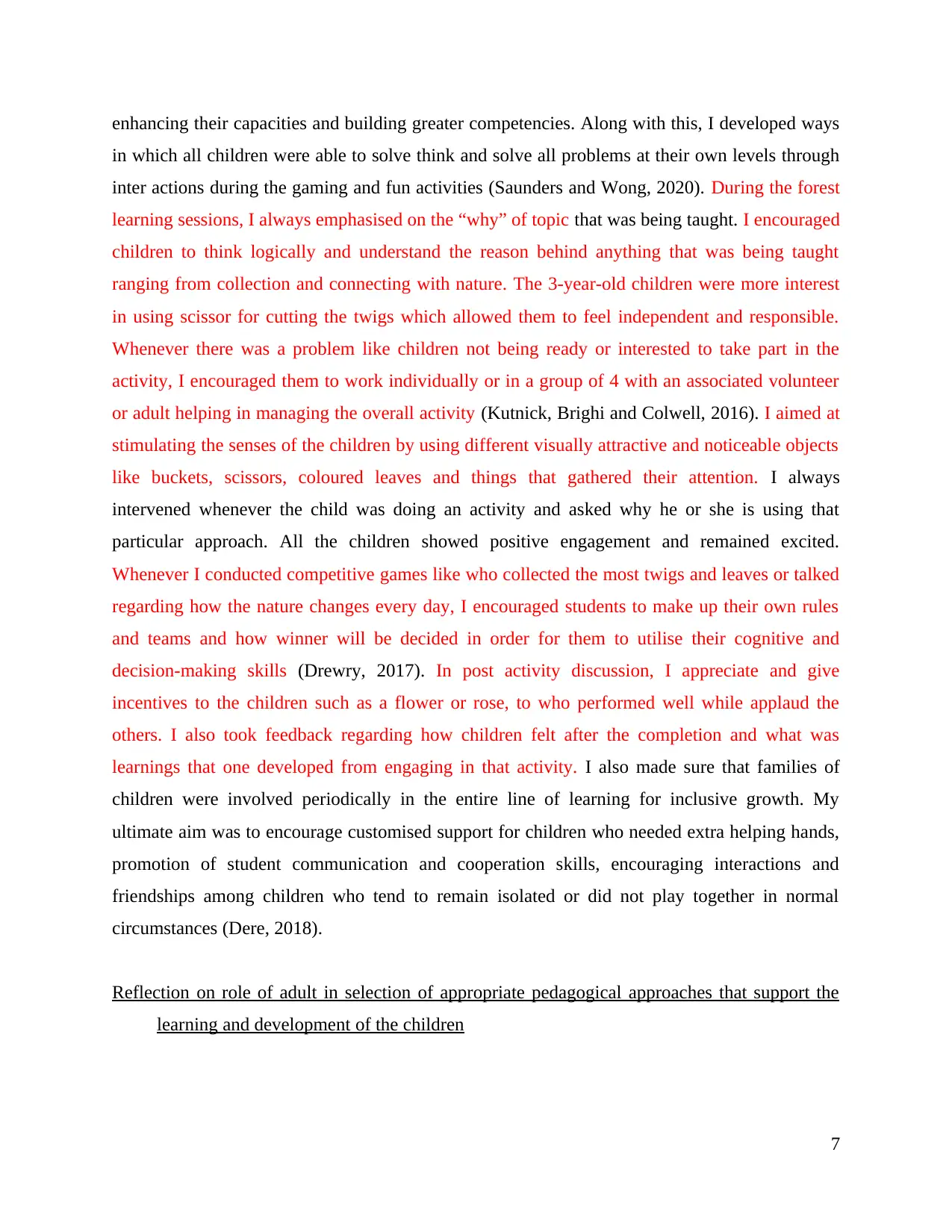
enhancing their capacities and building greater competencies. Along with this, I developed ways
in which all children were able to solve think and solve all problems at their own levels through
inter actions during the gaming and fun activities (Saunders and Wong, 2020). During the forest
learning sessions, I always emphasised on the “why” of topic that was being taught. I encouraged
children to think logically and understand the reason behind anything that was being taught
ranging from collection and connecting with nature. The 3-year-old children were more interest
in using scissor for cutting the twigs which allowed them to feel independent and responsible.
Whenever there was a problem like children not being ready or interested to take part in the
activity, I encouraged them to work individually or in a group of 4 with an associated volunteer
or adult helping in managing the overall activity (Kutnick, Brighi and Colwell, 2016). I aimed at
stimulating the senses of the children by using different visually attractive and noticeable objects
like buckets, scissors, coloured leaves and things that gathered their attention. I always
intervened whenever the child was doing an activity and asked why he or she is using that
particular approach. All the children showed positive engagement and remained excited.
Whenever I conducted competitive games like who collected the most twigs and leaves or talked
regarding how the nature changes every day, I encouraged students to make up their own rules
and teams and how winner will be decided in order for them to utilise their cognitive and
decision-making skills (Drewry, 2017). In post activity discussion, I appreciate and give
incentives to the children such as a flower or rose, to who performed well while applaud the
others. I also took feedback regarding how children felt after the completion and what was
learnings that one developed from engaging in that activity. I also made sure that families of
children were involved periodically in the entire line of learning for inclusive growth. My
ultimate aim was to encourage customised support for children who needed extra helping hands,
promotion of student communication and cooperation skills, encouraging interactions and
friendships among children who tend to remain isolated or did not play together in normal
circumstances (Dere, 2018).
Reflection on role of adult in selection of appropriate pedagogical approaches that support the
learning and development of the children
7
in which all children were able to solve think and solve all problems at their own levels through
inter actions during the gaming and fun activities (Saunders and Wong, 2020). During the forest
learning sessions, I always emphasised on the “why” of topic that was being taught. I encouraged
children to think logically and understand the reason behind anything that was being taught
ranging from collection and connecting with nature. The 3-year-old children were more interest
in using scissor for cutting the twigs which allowed them to feel independent and responsible.
Whenever there was a problem like children not being ready or interested to take part in the
activity, I encouraged them to work individually or in a group of 4 with an associated volunteer
or adult helping in managing the overall activity (Kutnick, Brighi and Colwell, 2016). I aimed at
stimulating the senses of the children by using different visually attractive and noticeable objects
like buckets, scissors, coloured leaves and things that gathered their attention. I always
intervened whenever the child was doing an activity and asked why he or she is using that
particular approach. All the children showed positive engagement and remained excited.
Whenever I conducted competitive games like who collected the most twigs and leaves or talked
regarding how the nature changes every day, I encouraged students to make up their own rules
and teams and how winner will be decided in order for them to utilise their cognitive and
decision-making skills (Drewry, 2017). In post activity discussion, I appreciate and give
incentives to the children such as a flower or rose, to who performed well while applaud the
others. I also took feedback regarding how children felt after the completion and what was
learnings that one developed from engaging in that activity. I also made sure that families of
children were involved periodically in the entire line of learning for inclusive growth. My
ultimate aim was to encourage customised support for children who needed extra helping hands,
promotion of student communication and cooperation skills, encouraging interactions and
friendships among children who tend to remain isolated or did not play together in normal
circumstances (Dere, 2018).
Reflection on role of adult in selection of appropriate pedagogical approaches that support the
learning and development of the children
7
Paraphrase This Document
Need a fresh take? Get an instant paraphrase of this document with our AI Paraphraser
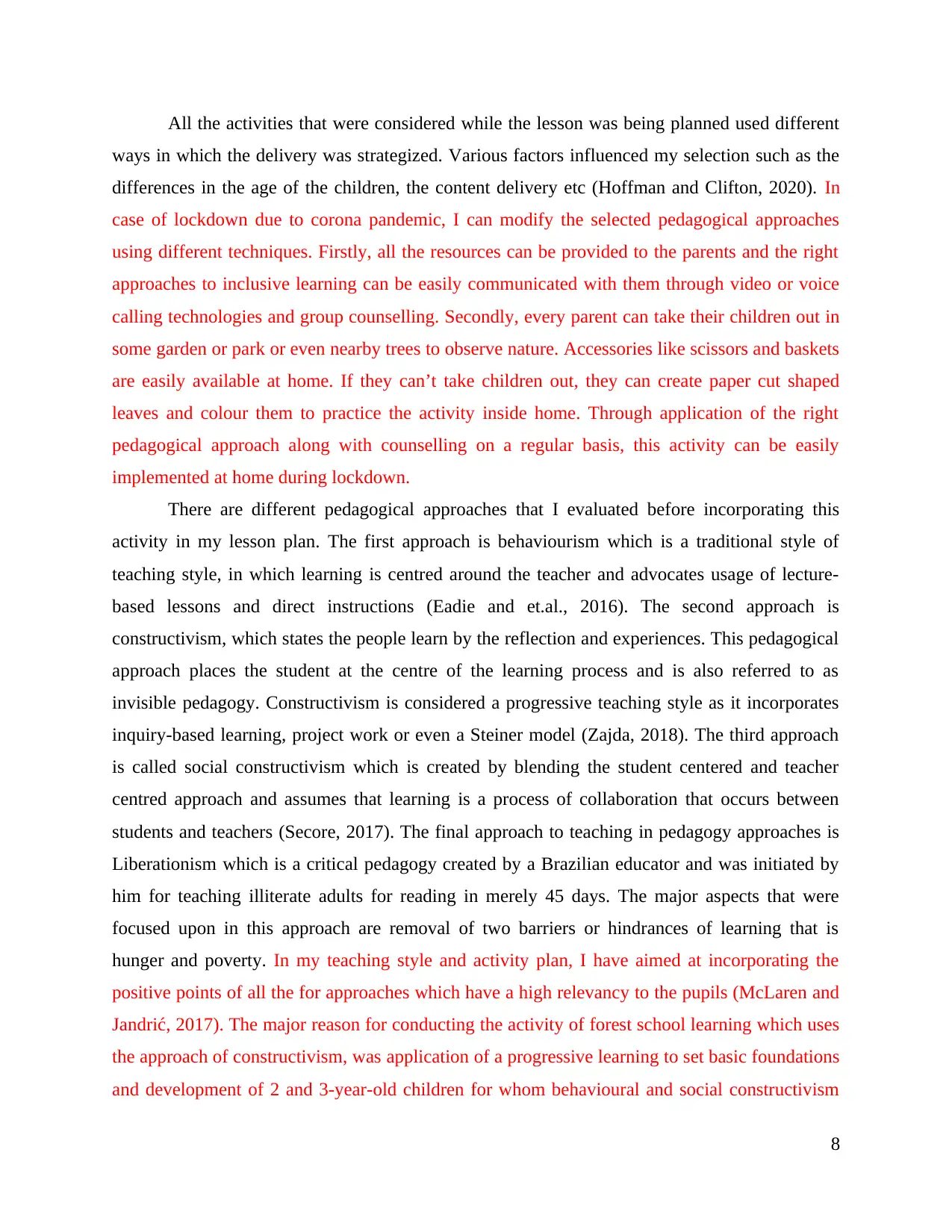
All the activities that were considered while the lesson was being planned used different
ways in which the delivery was strategized. Various factors influenced my selection such as the
differences in the age of the children, the content delivery etc (Hoffman and Clifton, 2020). In
case of lockdown due to corona pandemic, I can modify the selected pedagogical approaches
using different techniques. Firstly, all the resources can be provided to the parents and the right
approaches to inclusive learning can be easily communicated with them through video or voice
calling technologies and group counselling. Secondly, every parent can take their children out in
some garden or park or even nearby trees to observe nature. Accessories like scissors and baskets
are easily available at home. If they can’t take children out, they can create paper cut shaped
leaves and colour them to practice the activity inside home. Through application of the right
pedagogical approach along with counselling on a regular basis, this activity can be easily
implemented at home during lockdown.
There are different pedagogical approaches that I evaluated before incorporating this
activity in my lesson plan. The first approach is behaviourism which is a traditional style of
teaching style, in which learning is centred around the teacher and advocates usage of lecture-
based lessons and direct instructions (Eadie and et.al., 2016). The second approach is
constructivism, which states the people learn by the reflection and experiences. This pedagogical
approach places the student at the centre of the learning process and is also referred to as
invisible pedagogy. Constructivism is considered a progressive teaching style as it incorporates
inquiry-based learning, project work or even a Steiner model (Zajda, 2018). The third approach
is called social constructivism which is created by blending the student centered and teacher
centred approach and assumes that learning is a process of collaboration that occurs between
students and teachers (Secore, 2017). The final approach to teaching in pedagogy approaches is
Liberationism which is a critical pedagogy created by a Brazilian educator and was initiated by
him for teaching illiterate adults for reading in merely 45 days. The major aspects that were
focused upon in this approach are removal of two barriers or hindrances of learning that is
hunger and poverty. In my teaching style and activity plan, I have aimed at incorporating the
positive points of all the for approaches which have a high relevancy to the pupils (McLaren and
Jandrić, 2017). The major reason for conducting the activity of forest school learning which uses
the approach of constructivism, was application of a progressive learning to set basic foundations
and development of 2 and 3-year-old children for whom behavioural and social constructivism
8
ways in which the delivery was strategized. Various factors influenced my selection such as the
differences in the age of the children, the content delivery etc (Hoffman and Clifton, 2020). In
case of lockdown due to corona pandemic, I can modify the selected pedagogical approaches
using different techniques. Firstly, all the resources can be provided to the parents and the right
approaches to inclusive learning can be easily communicated with them through video or voice
calling technologies and group counselling. Secondly, every parent can take their children out in
some garden or park or even nearby trees to observe nature. Accessories like scissors and baskets
are easily available at home. If they can’t take children out, they can create paper cut shaped
leaves and colour them to practice the activity inside home. Through application of the right
pedagogical approach along with counselling on a regular basis, this activity can be easily
implemented at home during lockdown.
There are different pedagogical approaches that I evaluated before incorporating this
activity in my lesson plan. The first approach is behaviourism which is a traditional style of
teaching style, in which learning is centred around the teacher and advocates usage of lecture-
based lessons and direct instructions (Eadie and et.al., 2016). The second approach is
constructivism, which states the people learn by the reflection and experiences. This pedagogical
approach places the student at the centre of the learning process and is also referred to as
invisible pedagogy. Constructivism is considered a progressive teaching style as it incorporates
inquiry-based learning, project work or even a Steiner model (Zajda, 2018). The third approach
is called social constructivism which is created by blending the student centered and teacher
centred approach and assumes that learning is a process of collaboration that occurs between
students and teachers (Secore, 2017). The final approach to teaching in pedagogy approaches is
Liberationism which is a critical pedagogy created by a Brazilian educator and was initiated by
him for teaching illiterate adults for reading in merely 45 days. The major aspects that were
focused upon in this approach are removal of two barriers or hindrances of learning that is
hunger and poverty. In my teaching style and activity plan, I have aimed at incorporating the
positive points of all the for approaches which have a high relevancy to the pupils (McLaren and
Jandrić, 2017). The major reason for conducting the activity of forest school learning which uses
the approach of constructivism, was application of a progressive learning to set basic foundations
and development of 2 and 3-year-old children for whom behavioural and social constructivism
8
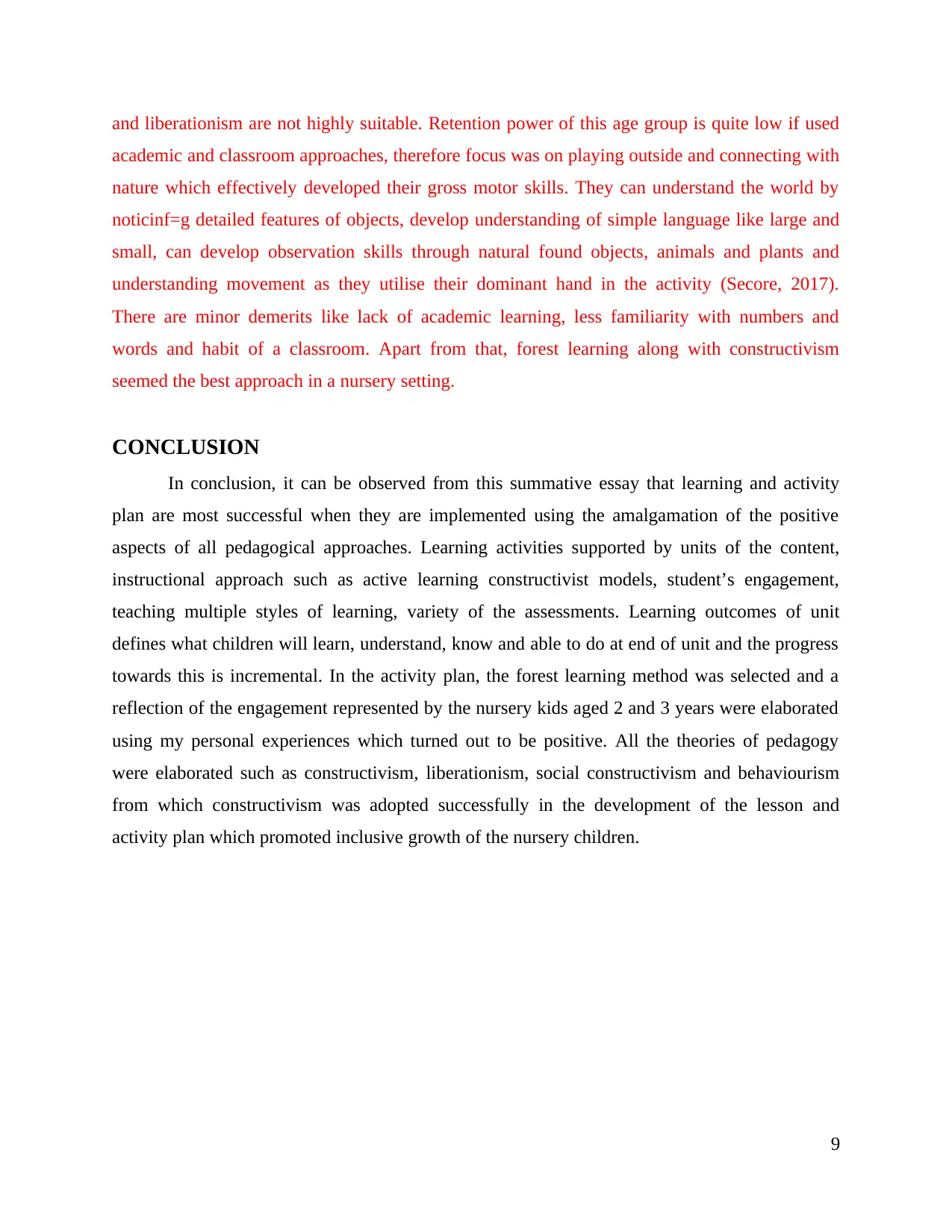
and liberationism are not highly suitable. Retention power of this age group is quite low if used
academic and classroom approaches, therefore focus was on playing outside and connecting with
nature which effectively developed their gross motor skills. They can understand the world by
noticinf=g detailed features of objects, develop understanding of simple language like large and
small, can develop observation skills through natural found objects, animals and plants and
understanding movement as they utilise their dominant hand in the activity (Secore, 2017).
There are minor demerits like lack of academic learning, less familiarity with numbers and
words and habit of a classroom. Apart from that, forest learning along with constructivism
seemed the best approach in a nursery setting.
CONCLUSION
In conclusion, it can be observed from this summative essay that learning and activity
plan are most successful when they are implemented using the amalgamation of the positive
aspects of all pedagogical approaches. Learning activities supported by units of the content,
instructional approach such as active learning constructivist models, student’s engagement,
teaching multiple styles of learning, variety of the assessments. Learning outcomes of unit
defines what children will learn, understand, know and able to do at end of unit and the progress
towards this is incremental. In the activity plan, the forest learning method was selected and a
reflection of the engagement represented by the nursery kids aged 2 and 3 years were elaborated
using my personal experiences which turned out to be positive. All the theories of pedagogy
were elaborated such as constructivism, liberationism, social constructivism and behaviourism
from which constructivism was adopted successfully in the development of the lesson and
activity plan which promoted inclusive growth of the nursery children.
9
academic and classroom approaches, therefore focus was on playing outside and connecting with
nature which effectively developed their gross motor skills. They can understand the world by
noticinf=g detailed features of objects, develop understanding of simple language like large and
small, can develop observation skills through natural found objects, animals and plants and
understanding movement as they utilise their dominant hand in the activity (Secore, 2017).
There are minor demerits like lack of academic learning, less familiarity with numbers and
words and habit of a classroom. Apart from that, forest learning along with constructivism
seemed the best approach in a nursery setting.
CONCLUSION
In conclusion, it can be observed from this summative essay that learning and activity
plan are most successful when they are implemented using the amalgamation of the positive
aspects of all pedagogical approaches. Learning activities supported by units of the content,
instructional approach such as active learning constructivist models, student’s engagement,
teaching multiple styles of learning, variety of the assessments. Learning outcomes of unit
defines what children will learn, understand, know and able to do at end of unit and the progress
towards this is incremental. In the activity plan, the forest learning method was selected and a
reflection of the engagement represented by the nursery kids aged 2 and 3 years were elaborated
using my personal experiences which turned out to be positive. All the theories of pedagogy
were elaborated such as constructivism, liberationism, social constructivism and behaviourism
from which constructivism was adopted successfully in the development of the lesson and
activity plan which promoted inclusive growth of the nursery children.
9
⊘ This is a preview!⊘
Do you want full access?
Subscribe today to unlock all pages.

Trusted by 1+ million students worldwide
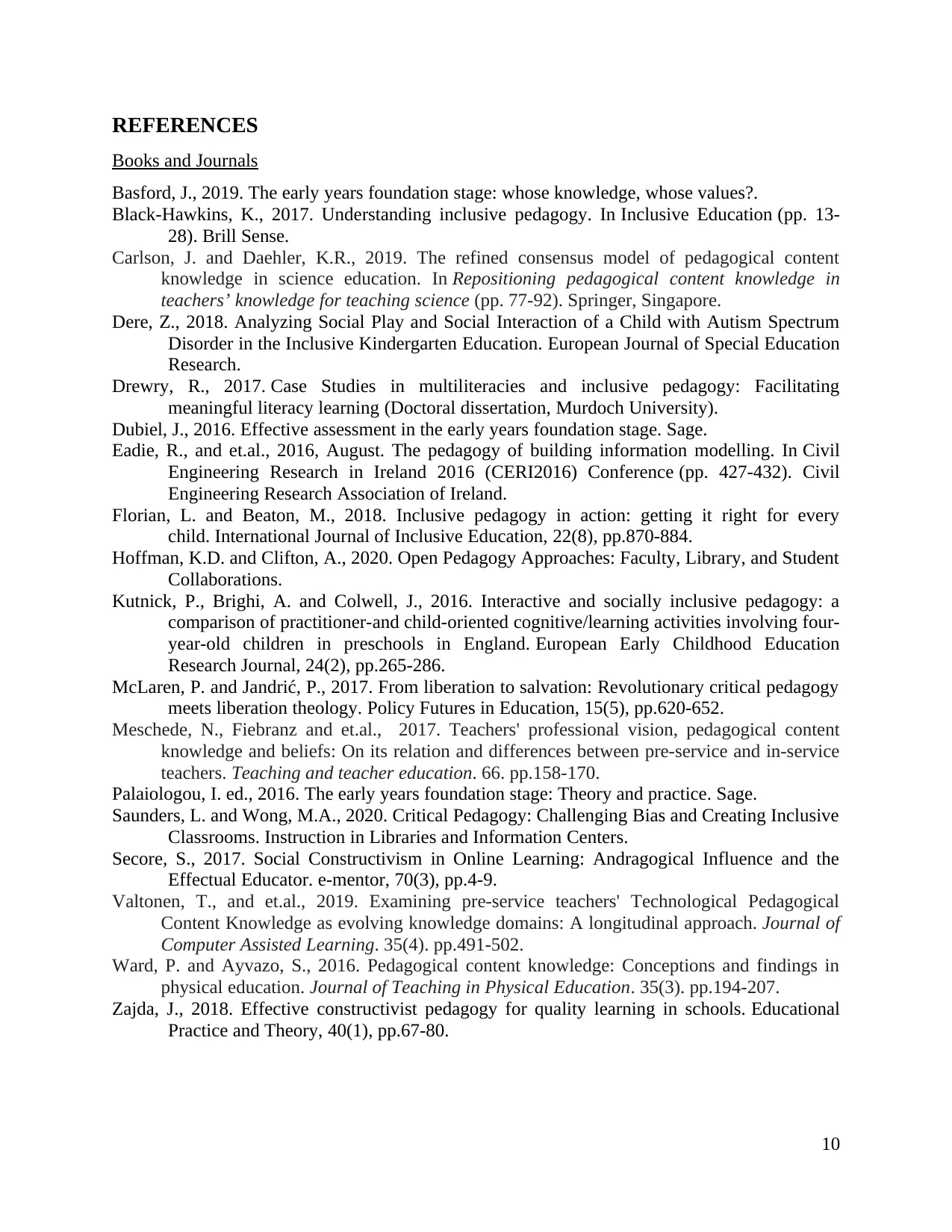
REFERENCES
Books and Journals
Basford, J., 2019. The early years foundation stage: whose knowledge, whose values?.
Black-Hawkins, K., 2017. Understanding inclusive pedagogy. In Inclusive Education (pp. 13-
28). Brill Sense.
Carlson, J. and Daehler, K.R., 2019. The refined consensus model of pedagogical content
knowledge in science education. In Repositioning pedagogical content knowledge in
teachers’ knowledge for teaching science (pp. 77-92). Springer, Singapore.
Dere, Z., 2018. Analyzing Social Play and Social Interaction of a Child with Autism Spectrum
Disorder in the Inclusive Kindergarten Education. European Journal of Special Education
Research.
Drewry, R., 2017. Case Studies in multiliteracies and inclusive pedagogy: Facilitating
meaningful literacy learning (Doctoral dissertation, Murdoch University).
Dubiel, J., 2016. Effective assessment in the early years foundation stage. Sage.
Eadie, R., and et.al., 2016, August. The pedagogy of building information modelling. In Civil
Engineering Research in Ireland 2016 (CERI2016) Conference (pp. 427-432). Civil
Engineering Research Association of Ireland.
Florian, L. and Beaton, M., 2018. Inclusive pedagogy in action: getting it right for every
child. International Journal of Inclusive Education, 22(8), pp.870-884.
Hoffman, K.D. and Clifton, A., 2020. Open Pedagogy Approaches: Faculty, Library, and Student
Collaborations.
Kutnick, P., Brighi, A. and Colwell, J., 2016. Interactive and socially inclusive pedagogy: a
comparison of practitioner-and child-oriented cognitive/learning activities involving four-
year-old children in preschools in England. European Early Childhood Education
Research Journal, 24(2), pp.265-286.
McLaren, P. and Jandrić, P., 2017. From liberation to salvation: Revolutionary critical pedagogy
meets liberation theology. Policy Futures in Education, 15(5), pp.620-652.
Meschede, N., Fiebranz and et.al., 2017. Teachers' professional vision, pedagogical content
knowledge and beliefs: On its relation and differences between pre-service and in-service
teachers. Teaching and teacher education. 66. pp.158-170.
Palaiologou, I. ed., 2016. The early years foundation stage: Theory and practice. Sage.
Saunders, L. and Wong, M.A., 2020. Critical Pedagogy: Challenging Bias and Creating Inclusive
Classrooms. Instruction in Libraries and Information Centers.
Secore, S., 2017. Social Constructivism in Online Learning: Andragogical Influence and the
Effectual Educator. e-mentor, 70(3), pp.4-9.
Valtonen, T., and et.al., 2019. Examining pre‐service teachers' Technological Pedagogical
Content Knowledge as evolving knowledge domains: A longitudinal approach. Journal of
Computer Assisted Learning. 35(4). pp.491-502.
Ward, P. and Ayvazo, S., 2016. Pedagogical content knowledge: Conceptions and findings in
physical education. Journal of Teaching in Physical Education. 35(3). pp.194-207.
Zajda, J., 2018. Effective constructivist pedagogy for quality learning in schools. Educational
Practice and Theory, 40(1), pp.67-80.
10
Books and Journals
Basford, J., 2019. The early years foundation stage: whose knowledge, whose values?.
Black-Hawkins, K., 2017. Understanding inclusive pedagogy. In Inclusive Education (pp. 13-
28). Brill Sense.
Carlson, J. and Daehler, K.R., 2019. The refined consensus model of pedagogical content
knowledge in science education. In Repositioning pedagogical content knowledge in
teachers’ knowledge for teaching science (pp. 77-92). Springer, Singapore.
Dere, Z., 2018. Analyzing Social Play and Social Interaction of a Child with Autism Spectrum
Disorder in the Inclusive Kindergarten Education. European Journal of Special Education
Research.
Drewry, R., 2017. Case Studies in multiliteracies and inclusive pedagogy: Facilitating
meaningful literacy learning (Doctoral dissertation, Murdoch University).
Dubiel, J., 2016. Effective assessment in the early years foundation stage. Sage.
Eadie, R., and et.al., 2016, August. The pedagogy of building information modelling. In Civil
Engineering Research in Ireland 2016 (CERI2016) Conference (pp. 427-432). Civil
Engineering Research Association of Ireland.
Florian, L. and Beaton, M., 2018. Inclusive pedagogy in action: getting it right for every
child. International Journal of Inclusive Education, 22(8), pp.870-884.
Hoffman, K.D. and Clifton, A., 2020. Open Pedagogy Approaches: Faculty, Library, and Student
Collaborations.
Kutnick, P., Brighi, A. and Colwell, J., 2016. Interactive and socially inclusive pedagogy: a
comparison of practitioner-and child-oriented cognitive/learning activities involving four-
year-old children in preschools in England. European Early Childhood Education
Research Journal, 24(2), pp.265-286.
McLaren, P. and Jandrić, P., 2017. From liberation to salvation: Revolutionary critical pedagogy
meets liberation theology. Policy Futures in Education, 15(5), pp.620-652.
Meschede, N., Fiebranz and et.al., 2017. Teachers' professional vision, pedagogical content
knowledge and beliefs: On its relation and differences between pre-service and in-service
teachers. Teaching and teacher education. 66. pp.158-170.
Palaiologou, I. ed., 2016. The early years foundation stage: Theory and practice. Sage.
Saunders, L. and Wong, M.A., 2020. Critical Pedagogy: Challenging Bias and Creating Inclusive
Classrooms. Instruction in Libraries and Information Centers.
Secore, S., 2017. Social Constructivism in Online Learning: Andragogical Influence and the
Effectual Educator. e-mentor, 70(3), pp.4-9.
Valtonen, T., and et.al., 2019. Examining pre‐service teachers' Technological Pedagogical
Content Knowledge as evolving knowledge domains: A longitudinal approach. Journal of
Computer Assisted Learning. 35(4). pp.491-502.
Ward, P. and Ayvazo, S., 2016. Pedagogical content knowledge: Conceptions and findings in
physical education. Journal of Teaching in Physical Education. 35(3). pp.194-207.
Zajda, J., 2018. Effective constructivist pedagogy for quality learning in schools. Educational
Practice and Theory, 40(1), pp.67-80.
10
1 out of 10
Related Documents
Your All-in-One AI-Powered Toolkit for Academic Success.
+13062052269
info@desklib.com
Available 24*7 on WhatsApp / Email
![[object Object]](/_next/static/media/star-bottom.7253800d.svg)
Unlock your academic potential
Copyright © 2020–2026 A2Z Services. All Rights Reserved. Developed and managed by ZUCOL.





